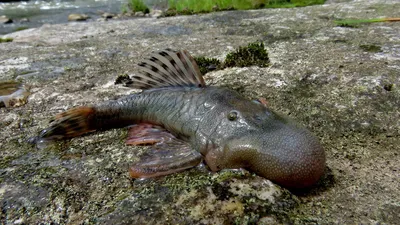Water News for December 2024
Effectiveness of Antimicrobial Shower Heads Questioned
To guard against harmful waterborne pathogens, many consumers, including managers of health-care facilities, install antimicrobial silver-containing shower heads. But researchers now report that these fixtures are no “silver bullet.” In real-world showering conditions, most microbes aren’t exposed to the silver long enough to be killed. However, the composition of rare microbes in water from these shower heads varied with each type of fixture tested. Water Online (Gazette note: Common sense should tell us that at the flow rate of shower water microbes in water aren’t going to be controlled by the tiny amount of silver in a shower filter. Silver in the shower head may slow down the growth of bacteria in other media of the filter, but it isn’t capable of eliminating microbes in contaminated water. )
Scientists are still not sure what the fish’s blob is used for
During an expedition in the Alto Mayo region of Peru, part of the Amazon rainforest, researchers identified 27 new species, including an amphibious mouse with webbed feet and a unique “blob-headed” fish.
Water Used as Weapon in Gaza
Israel’s restriction of Gaza’s water supply to levels below minimum needs amounts to an act of genocide and extermination as a crime against humanity, a report from Human Rights Watch has alleged. It has accused Israeli forces of deliberate actions intended to cut the availability of clean water so drastically that the population has been forced to resort to contaminated sources, leading to the outbreak of lethal diseases, especially among children. The Guardian
World’s oldest iceberg is moving
ANTARCTICA: The world’s largest and oldest iceberg A23a is on the move. After decades of being grounded on the seafloor and more recently spinning on the spot, the mega-iceberg has broken free from its position north of the South Orkney Islands and is now drifting in the Southern Ocean. The colossus A23a, which is double the size of Greater London and weighs nearly a trillion tons, calved from Antarctica’s Filchner Ice Shelf in 1986, and remained grounded on the seabed in the Weddell Sea for over 30 years before beginning its slow journey north in 2020.Full story from British Antarctic Survey.
Study Finds that River Flow Patterns Are Changing
UC College of Engineering and Applied Science Assistant Professor Dongmei Feng and her research partner, Colin Gleason at the University of Massachusetts Amherst, mapped the flow of water in nearly 3 million rivers, creeks and streams for the past 35 years and discovered more water flowing in upstream headwaters and decreasing flows downstream where more people live.
The study published in the journal Science identified an increase in catastrophic floods known as 100-year floods in upstream waters over the last 35 years.
Researchers found significant declines in water flow in 44% of downstream sections of rivers and significant increases in 17% of upstream sections.
These changes can have profound effects on navigability, pollution, potability and even hydroelectric power. More sedimentation can cut off water flow to dams and damage turbines.
EPA Issues Complete Ban on TCE
Final EPA rules ban all uses of TCE. All consumer uses and many commercial uses of PCE require worker protections.
On Dec. 9, 2024 the U.S. Environmental Protection Agency (EPA) finalized the latest risk management rules for trichloroethylene (TCE) and perchloroethylene (PCE) under the bipartisan 2016 Toxic Substances Control Act (TSCA) amendments, marking another major milestone for chemical safety after decades of inadequate protections and serious delays. These protections align with President Biden’s Cancer Moonshot, a whole-of-government approach to end cancer as we know it.
Iowa is “in crisis” due to illegal manure discharges into waterways
Iowa regulators are failing to properly penalize Iowa factory farms for illegally contaminating state waterways with animal waste, according to an analysis just released by a public health advocacy group. Between 2013 and 2023, the Iowa Department of Natural Resources (DNR) recorded 179 incidents in which livestock operators discharged manure in violation of the law, fouling creeks and rivers and killing off more than one million fish, according to Food & Water Watch, which based its report on a review of state discharge enforcement reports. The quantities of discharges ranged up to 1 million gallons, the group said. Full story in The New Lede.






